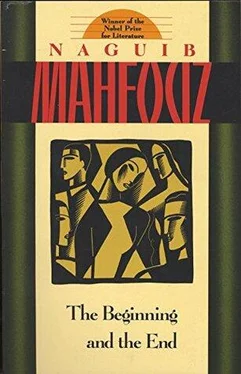Naguib Mahfouz - The Beginning and the End
Здесь есть возможность читать онлайн «Naguib Mahfouz - The Beginning and the End» весь текст электронной книги совершенно бесплатно (целиком полную версию без сокращений). В некоторых случаях можно слушать аудио, скачать через торрент в формате fb2 и присутствует краткое содержание. Год выпуска: 2016, Издательство: Anchor Books, Жанр: Классическая проза, на английском языке. Описание произведения, (предисловие) а так же отзывы посетителей доступны на портале библиотеки ЛибКат.
- Название:The Beginning and the End
- Автор:
- Издательство:Anchor Books
- Жанр:
- Год:2016
- ISBN:нет данных
- Рейтинг книги:4 / 5. Голосов: 1
-
Избранное:Добавить в избранное
- Отзывы:
-
Ваша оценка:
- 80
- 1
- 2
- 3
- 4
- 5
The Beginning and the End: краткое содержание, описание и аннотация
Предлагаем к чтению аннотацию, описание, краткое содержание или предисловие (зависит от того, что написал сам автор книги «The Beginning and the End»). Если вы не нашли необходимую информацию о книге — напишите в комментариях, мы постараемся отыскать её.
The Beginning and the End — читать онлайн бесплатно полную книгу (весь текст) целиком
Ниже представлен текст книги, разбитый по страницам. Система сохранения места последней прочитанной страницы, позволяет с удобством читать онлайн бесплатно книгу «The Beginning and the End», без необходимости каждый раз заново искать на чём Вы остановились. Поставьте закладку, и сможете в любой момент перейти на страницу, на которой закончили чтение.
Интервал:
Закладка:
“Let’s think it over carefully,” she said curtly.
Moved as usual by his passions, Hassanein was thinking fast, disguising his egocentricity behind what he believed to be the common good. “Life has become intolerable,” he said. “We’re ill-nourished and almost always hungry, our clothes torn, darned, or threadbare, and our house is empty. We shouldn’t prolong our suffering. We’ve no choice but to become practical about our lives,” he said.
Understanding his brother well, Hussein realized at once what he was driving at. Convinced though he was of the substance of his brother’s argument, he was irritated at his cunning. “Why do you say ‘we’ when I’m the only person involved in this matter?” Hussein asked.
Realizing that his brother usually divined his ulterior motives, Hassanein became disturbed. “I’m laying down a general principle that applies to you right now and to me in the future,” he said.
“You mean to say that I should find a job?”
Hassanein avoided an answer. “What do you think?” he asked.
Hussein turned to his mother. “What do you think, Mother?” he asked with a smile.
His smile affected her profoundly. She realized that he was placing his career in her hands, and that he was transferring responsibility for his future to her shoulders alone. But she would never persuade him to do anything against his will. Never, even if that meant that they must endure further humiliation for another four years. Of her three sons he was the only one who obeyed her without resentment or hesitation. So how could she permit him to become the family’s sacrificial goat?
“Hussein, your opinion will be mine, too,” she said unequivocally.
Hussein smiled mysteriously. Impelled by an irresponsible desire to annoy Hassanein, he said, “I’m thinking of continuing my higher education.”
“You’ve chosen the right thing.” Nefisa was pleased.
“This means four more lean years,” Hassanein said hesitantly.
“No, just one more year, and at the end of it, by God’s will, you’ll become an employee,” Hussein said with a grin.
Defeated, Hassanein laughed. “Perhaps,” he said apologetically, “you think that I want you to find a job to give me a chance to continue my higher education in peace and security. But, in fact, I want to relieve our suffering family. Besides, granting that to be employed on the baccalaureate is a sacrifice, you should be the one to make this sacrifice, not because I wish to deny you something which I want to get for myself, but because our family can make use of your sacrifice right now, while it has to wait another year to make use of mine.”
“This is false logic. I’m sure that you won’t agree to make any sacrifices, neither this year nor the next,” Hussein said, laughing.
The mother intervened to decide the matter once and for all. “Do what you like, Hussein. We’ve no objection,” she said.
Smiling at her serenely, he remarked, “I didn’t mean a word of what I said. I just wanted to make it clear to him that I understand him well enough. I don’t even blame him for the way he thinks; he has his reasons. Now, one of us two has to make sacrifices and accept a job. As the elder brother and having obtained the baccalaureate, it’s my duty to do so. I know how bad our circumstances are, and how wicked and cruel it would be of me to think of continuing my education. I must be content with my lot. Let’s all pray to God to help us get what we want.”
Despite their expressions of regret, Hussein could see relief in all their eyes. Sorry though he was, he experienced feelings of peace and pleasure. Our family, he thought, has almost forgotten all sense of relief and security. I should be glad to restore some such feelings to them. Why should I regret my sacrifice? To be a teacher or a clerk is all the same to me. Had our dreams been down-to-earth, we wouldn’t have subjected ourselves to sorrow and frustration.
FORTY-FIVE
“There is Ahmad Bey Yousri, your late father’s friend,” Samira said to her son. “He can find a job for you overnight.”
She remained for a while absorbed in her thoughts. “My overcoat is too shabby for me to put in an appearance before respectable people,” she continued. “I can’t go in person to him. So you go to him and take your brother along to give you courage. Only mention to the porter that you’re the late Kamel Effendi’s sons.”
In the afternoon the two brothers went to Taher Street. Arriving at the villa, as instructed by their mother they told the porter they wished to see the Bey. After a few minutes, the porter returned to lead them to the sitting room. Walking along a path through the center of the garden, they cast astonished glances at the variety of flowers, their delightful colors enlivening the place. They climbed a flight of stairs leading to a grand reception hall. Confused, the two brothers sat close to the door in the same place their mother had chosen on her visit to the Bey two years earlier. They glanced quickly at the thick carpet covering the vast floor of the room, the many elegant seats, cushions, rich hanging rugs, gigantic curtains on the walls, and a chandelier with electric lamps suspended in a halo of dazzling light from a high ceiling.
Pointing to the chandelier, Hassanein said, “It’s like the chandelier in the mosque of Saidna al-Hussein.”
Hussein was preoccupied with other matters. “Yes,” he said. “But forget about the chandelier. What should we say to him? You must use your tongue to help me!”
“Do you think that you’ll be addressing the devil?” Hassanein said sarcastically. “Speak boldly, and I’ll speak too. Damn him!”
His curse, free from resentment, was intended to encourage his brother as well as himself. He was stunned by the luxurious surroundings.
“Do you think Ahmad Bey’s heirs will be sorry when he dies?” he asked in a low voice.
“Wouldn’t we be sorry for our father’s death if he were rich?” Hussein said.
Pondering, Hassanein knit his eyebrows. “I think we would,” he said. “But perhaps sorrow has different shades and gradations. Oh! Why wasn’t our father a rich man?”
“This is another question.”
“But it’s an all-important one. Tell me, how did this Bey get rich?”
“Perhaps he was born wealthy.”
Hassanein’s hazel eyes glistened. “We must all be rich,” he said.
“And if this is impossible?”
“Then we must all be poor.”
“And if this is impossible, too?”
“In that case we must revolt, murder, and steal,” he replied angrily.
“This is exactly what mankind has been doing for thousands of years,” Hussein remarked with a smile.
“It pains me to think of spending our lives in toil and squalor until we die.”
“God forbid.” Hussein smiled.
Before Hassanein could open his mouth again, they heard footsteps approaching from the veranda. Then the Bey entered, his tall, broad body garbed in a white silk suit. As he shook their hands in welcome, his laughing eyes scrutinized their faces. He said to them as he sat down, “Welcome to the sons of the dear departed. How is your mother?”
The two young men thanked him simultaneously. The man’s warm welcome thawed Hassanein’s resentment, but Hussein’s confusion returned. Ahmad Bey was afraid this meeting might involve demands for his assistance. He took it for granted that, if a request was made, he would have to comply with it. Though he was not a miser, his generosity was not voluntary. He would be upset and annoyed to be asked for help but would act generously, unable to turn down any such request.
Overcoming his confusion, Hussein spoke in a soft, courteous voice, so full of supplication and entreaty that his words seemed superfluous. “Sir, I have obtained the baccalaureate. Our family circumstances force me to look for a job. My mother has sent me to Your Excellency, and we all have great hope that you would kindly extend a helping hand to us.”
Читать дальшеИнтервал:
Закладка:
Похожие книги на «The Beginning and the End»
Представляем Вашему вниманию похожие книги на «The Beginning and the End» списком для выбора. Мы отобрали схожую по названию и смыслу литературу в надежде предоставить читателям больше вариантов отыскать новые, интересные, ещё непрочитанные произведения.
Обсуждение, отзывы о книге «The Beginning and the End» и просто собственные мнения читателей. Оставьте ваши комментарии, напишите, что Вы думаете о произведении, его смысле или главных героях. Укажите что конкретно понравилось, а что нет, и почему Вы так считаете.












